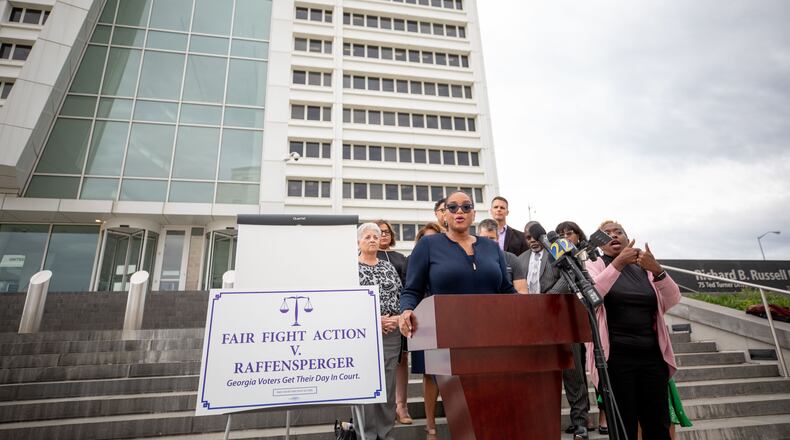A federal judge delivered a decisive ruling Friday against allies of Democrat Stacey Abrams in their 4-year-old voting rights lawsuit, upholding Georgia election laws on all counts in the case Fair Fight Action filed days after the 2018 election.
U.S. District Judge Steve Jones’ judgment concludes the ambitious case against Georgia’s voter registration and absentee ballot practices after a trial in which voters testified about problems at the polls but few of them were unable to cast a ballot.
“Although Georgia’s election system is not perfect, the challenged practices violate neither the Constitution nor the VRA (Voting Rights Act),” Jones wrote in a 288-page order.
The decision followed what is believed to be the longest voting rights trial in the history of the Northern District of Georgia, lasting 21 days with testimony from over 50 witnesses, wrote Jones, a nominee of President Barack Obama.
Jones ruled against Fair Fight on claims over Georgia’s “exact match” voter registration policy, absentee ballot cancellation practices and registration inaccuracies.
The decision in the case, filed in the wake of Abrams’ loss to Republican Brian Kemp in the 2018 election for governor, comes five weeks before this year’s Election Day, when Abrams and Kemp are again facing each other.
“From day one, Abrams has used this lawsuit to line her pockets, sow distrust in our democratic institutions, and build her own celebrity,” Kemp said in a tweet. “Judge Jones’ ruling exposes this legal effort for what it really is: a tool wielded by a politician hoping to wrongfully weaponize the legal system to further her own political goals.”
Abrams said the case exposed “voter suppression,” and she will continue to fight for increased voting access.
“The court’s order explicitly lays out the hazards of a system rife with barriers that disproportionately impacted Black and brown people,” Abrams said. “As governor, I will expand the right to vote, not attack voters as they exercise the prerogatives of citizenship. I will defend minority voters, not bemoan their increased power or grow ‘frustrated’ by their success.”
The case started with a far-reaching goal of making fundamental changes to Georgia elections, invoking the Voting Rights Act’s protections against racial discrimination.
Fair Fight brought the case three weeks after Election Day in 2018, when Abrams refused to concede but acknowledged Kemp had won. She blamed the results, in part, on Georgia’s policies that she said created obstacles for voters while Kemp oversaw elections as secretary of state.
But over the years, a series of rulings threw out many of Fair Fight’s claims over long lines, voting machines, inadequate poll worker training, ballot rejections and large-scale voter registration cancellations.
The trial focused on the remaining allegations, including the state’s “exact match” rules that flagged new voters for inconsistencies in names that include hyphens or apostrophes, requiring them to verify their ID before they could cast a ballot. The plaintiffs in the case argued the policy was racially discriminatory because nearly 70% of 47,000 potential voters affected by “exact match” were Black.
“The court finds that the burden on voters is relatively low,” Jones wrote about the “exact match” rules. “Here, plaintiffs have not provided direct evidence of a voter who was unable to vote, experienced longer wait times, was confused about voter registration status.”
Credit: University of Georgia
Credit: University of Georgia
Naturalized U.S. citizens also alleged they faced barriers to voting because their registration records weren’t updated after they earned their citizenship. They needed to provide documentation before they could vote.
In addition, the case included allegations that state election officials failed to properly train county election workers on the process for canceling absentee ballots, causing significant problems for voters who never received absentee ballots they requested.
The plaintiffs also alleged problems with the state’s voter registration list when registrations were canceled because of felony convictions, duplicate records were merged and dead voters were removed.
Secretary of State Brad Raffensperger said Georgia’s elections have always been secure, balancing voter access with protections against fraud.
“This is a win for all Georgia elections officials who dedicate their lives to safe, secure and accessible elections,” Raffensperger said. “Stolen election and voter suppression claims by Stacey Abrams were nothing but poll-tested rhetoric not supported by facts and evidence.”
Fair Fight Action Executive Director Cianti Stewart-Reid said the case’s significance isn’t diminished by the judge’s ruling after more than 3,000 voters reported their election experiences to the voting rights organization.
“In this moment of frustration, we also are here to remind the nation: Litigation is only one tool to fight against voter suppression,” Stewart-Reid said. “Their stories were not shared in vain. Rather, they enable Fair Fight Action and our allies to shine a light on the burdensome and discriminatory features of Georgia’s elections system while advocating for commonsense, pro-voter solutions.”
Before the case went to trial, Fair Fight won a minor victory following court hearings on mass voter cancellations of infrequent voters, called “voter purges” by critics.
The secretary of state’s office reinstated 22,000 voters whose registrations were initially canceled in 2019 after Fair Fight challenged how much time had to pass before they were removed from the rolls. There were still 287,000 registration cancellations that year of people who hadn’t voted since before 2012 or had moved away.
This case didn’t address the voting law Georgia’s General Assembly passed after the 2020 presidential election, which limited ballot drop box availability, imposed new rules for absentee voting and banned handing out water and food to voters waiting in line.
A different federal judge has upheld most of that law, Senate Bill 202, which will be in place for this year’s elections.
About the Author
Keep Reading
The Latest
Featured




